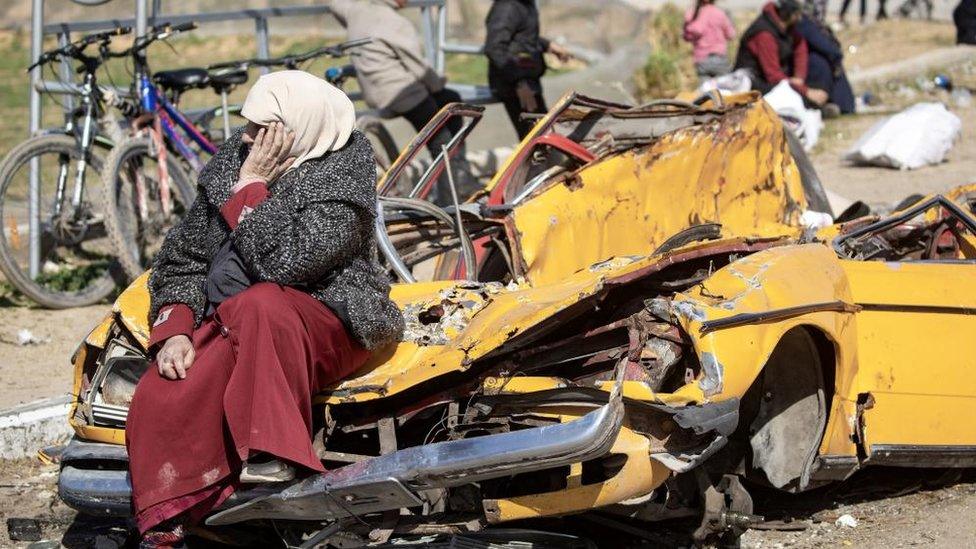UN's top court hears key case on Israeli occupation of the Palestinian Territories
- Published
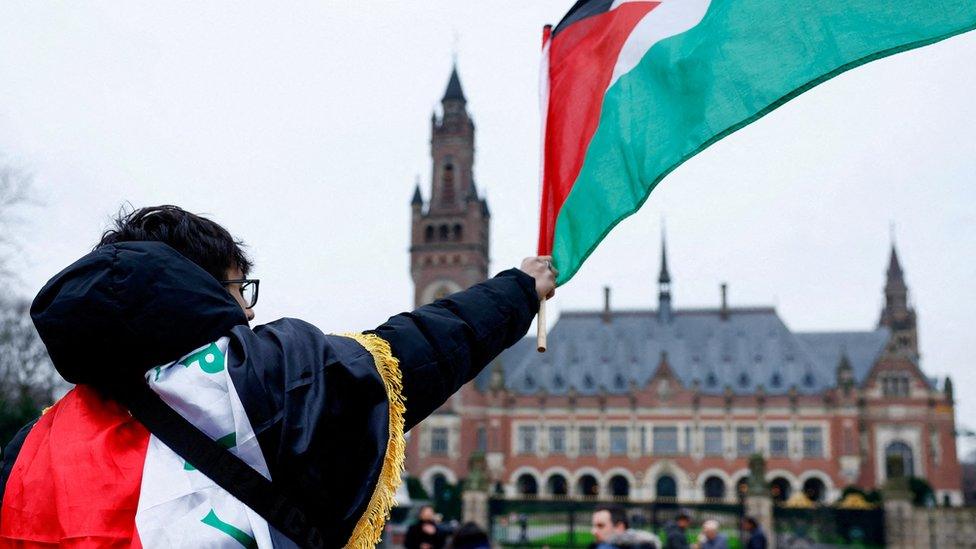
A man waves a Palestinian flag outside the International Court of Justice
The UN's top court, the International Court of Justice (ICJ), is hearing the final arguments in a case challenging Israel's 56-year occupation of the West Bank and Gaza.
The question at the heart of this week's hearings is: What are the legal consequences of Israel's occupation of the Palestinian territories?
It may not have the drama of recent World Court cases, but leading international lawyer Philippe Sands told the BBC: "In terms of the legal outcomes, and solution that must ultimately be found, this is as significant as it gets."
This case was initiated by a UN General Assembly (UNGA) resolution in December 2022, before the 7 October attacks by Hamas last year, and Israel's military response in the Gaza Strip.
What arguments have been heard?
On the opening day of hearings last week, Riad al-Maliki, the Palestinian Authority (PA)'s foreign minister, accused Israel of "colonialism and apartheid" and of violating the Palestinian people's right to self-determination.
He illustrated his presentation using a series of maps appearing to show the dramatic erosion of Palestinian territory.
The final picture was shown of the Israeli prime minister, Benjamin Netanyahu, at the UNGA last September, holding up a map that he called the "new" Middle East in which all traces of Palestinian territory had been removed.
"There is no Palestine at all on this map, only Israel, comprised of all the land from Jordan River to the Mediterranean Sea," Mr al-Maliki told the hearing.
"This shows you what the prolonged, continuous Israeli occupation of Palestine is intended to accomplish - the complete disappearance of Palestine and the destruction of the Palestinian people."
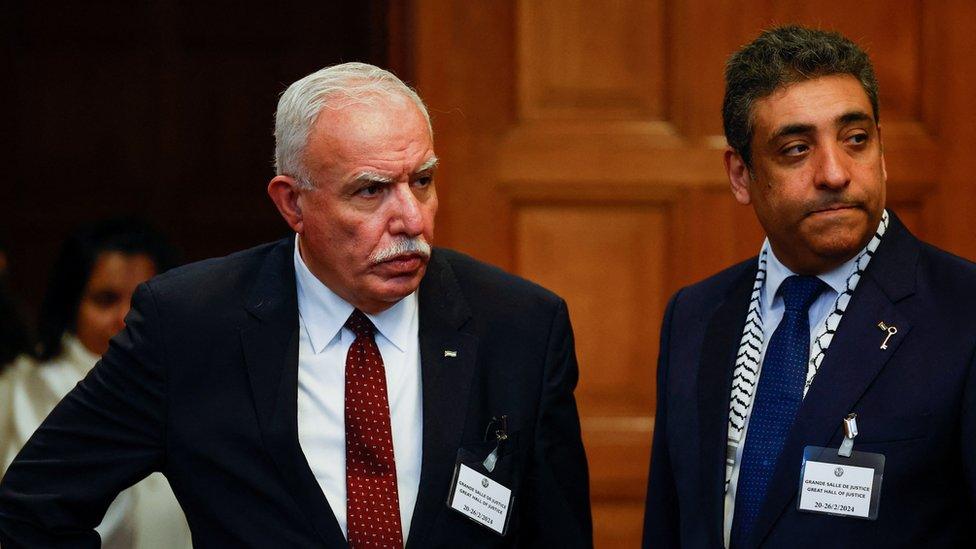
Palestinian Foreign Minister Riad al-Maliki (left) told the hearing Palestinian territory was being eroded by the occupation
International lawyer Paul S Reichler told the ICJ that permanent occupation is a legal oxymoron. An occupation which continues indefinitely becomes an annexation, he said.
Philippe Sands, who was among the PA's legal team, told the judges: "The right of self-determination... requires that UN member states bring Israel's occupation to an immediate end.
"No aid, no assistance, no complicity, no contribution to forcible actions, no money, no arms, no trade. No nothing."
Many countries used their 30-minute presentations to argue that the Palestinian people's right to self-determination was being violated by Israel's occupation.
Israel declined to take part in the hearings, instead submitting a written statement arguing the proceedings were "harmful" to ongoing efforts to resolve the conflict, because the questions posed by the UN were prejudicial.
However, Israel's closest allies did participate.
The United States told the ICJ that an order of withdrawal without security assurances would be detrimental to peace negotiations. It asked the judges to ensure any advisory opinion would serve to reinforce rather than destabilise the prospect of a two-state solution.
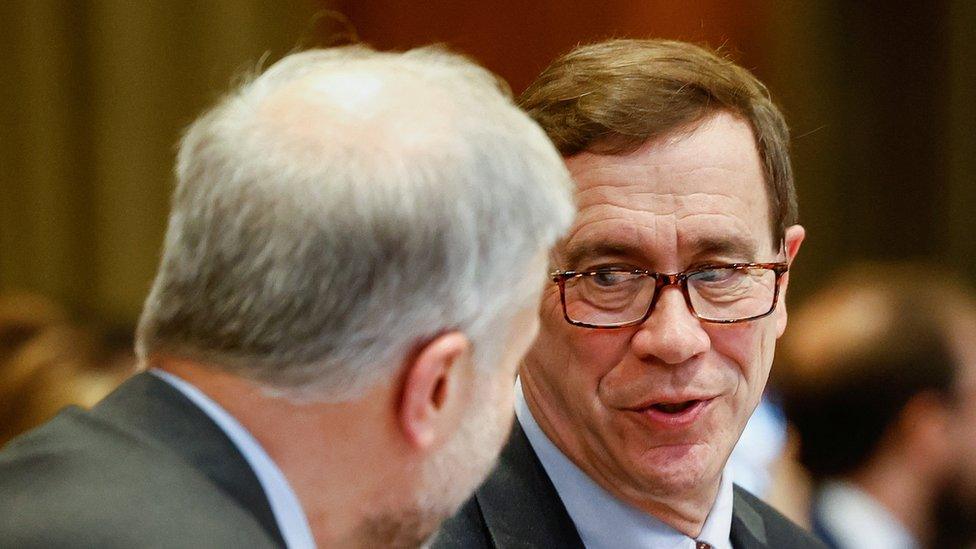
Richard Visek, a US state department official, attended the ICJ hearing
The UK went further than any other country, in asking the panel of 15 international judges not to issue an advisory opinion at all, because Israel had not consented to the process.
This may in part be linked to another case at the ICJ brought by Mauritius against the UK with regards to the Chagos Islands, in which the UK made the same argument, and lost.
A number of countries referred to the Hamas attacks in which about 1,200 people were killed and more than 250 taken to Gaza as hostages as evidence of Israel's need for security. By extension they argued that any withdrawal of Israeli forces must be accompanied by security assurances.
Why do these proceedings matter?
If the ICJ issues a non-legally binding advisory opinion, it then goes to the UN General Assembly, which adopts a resolution. That would be significant and could constitute a catalyst for negotiations and set the legal parameters for a future negotiated settlement.
If the court's opinion is that Israel's occupation is illegal, it will tell all UN bodies and nations they must do nothing to support or contribute to the current situation.
Such a ruling could potentially have far-reaching trade implications, but of greatest significance would be the consequences for the legitimacy of Israel's position. Countries like the US may find it increasingly difficult to continue to support Israel.
The current case brought by the UNGA represents the first time since the 1940s that the UN's highest judicial body has had a chance to address the totality of these issues.
Over the past few weeks, some of the ICJ presentations have gone viral on TikTok, reflecting how legal arguments which can often feel remote and disconnected are resonating with audiences in this case, well beyond the ICJ's Great Hall of Justice.
Meanwhile, Human Rights Watch has accused Israel of committing acts amounting to "collective punishment" by ignoring a separate ICJ order to enable aid delivery to Gaza, and thus exposing the 2.3 million Palestinians trapped in Gaza to the prospect of starvation.
On Monday, Israeli officials confirmed that a response had been delivered to the ICJ regarding the court's demand, on 26 January, that Israel report back on a series of steps to prevent genocide from occurring in Gaza.
The Israeli government has not yet said what the response contains.
- Published24 May 2024
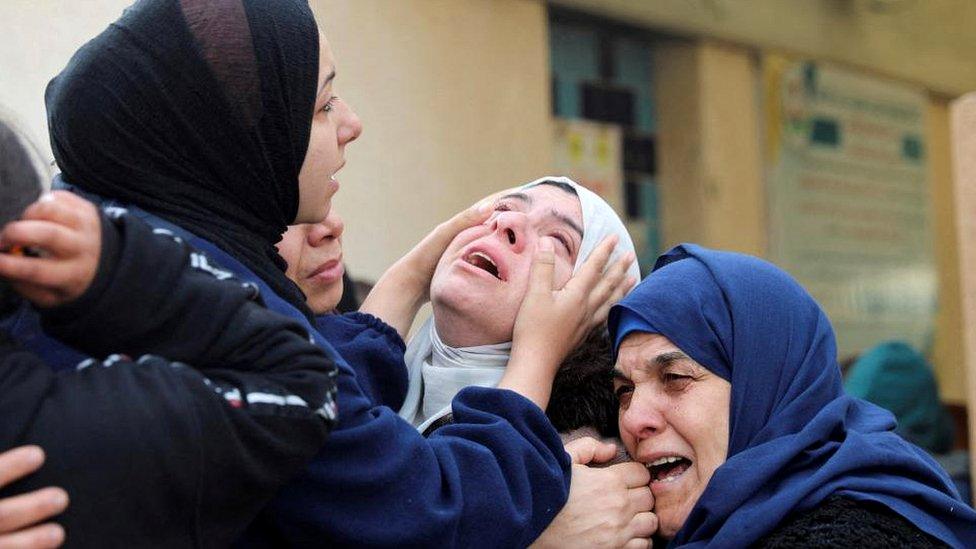
- Published26 January 2024
